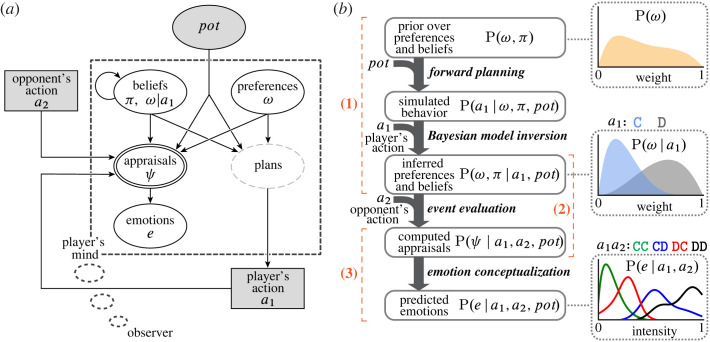Figure 1.
Emotion prediction as inference over an intuitive Theory of Mind. Hypotheses about how human observers reason about others’ emotions can be formalized as probabilistic generative models. This reflects a hypothesis about observers’ intuitive theory of other people’s minds, not a scientific hypothesis about people’s actual emotions. (a) Implementation of the general hypothesis for the ‘Split or Steal’ game (a public one-shot Prisoner’s Dilemma). We treat observers’ emotion predictions as a function of their intuitive reasoning about how players will subjectively evaluate, or ‘appraise’, the game’s outcome. Observers predict a player’s emotions by inferring what preferences and beliefs motivated the player’s decision to Cooperate or Defect, and reason about how those preferences and beliefs would cause the player to emotionally react to the outcome of the game. The intuitive theories we test take the form of directed acyclic graphs, where arrows indicate the causal relationship between variables. Shaded nodes are observable variables and open nodes are latent variables. Round nodes are continuous variables, rectangular nodes are discrete variables. Nodes with a single border are random variables. The double border indicates that appraisals are calculated deterministically. Plans are shown with a partial border because they are not explicitly represented in this model. (b) Computational model of the intuitive theory. The model comprises three modules. Module (1) infers a joint distribution over preferences and beliefs given a player’s action via inverse planning. Module (2) computes appraisals based on how a player would evaluate the outcome of the game with respect to the inferred preferences and beliefs. Module (3) generates emotion predictions by transforming the computed appraisals. The probability density plots illustrate how observers’ prior belief about a player’s preference is updated based on the player’s action, and how the inferred preference is used to predict the player’s emotional reaction to the game’s outcome .

